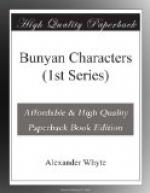By-ends was so called because he was full of low, mean, selfish motives, and of nothing else. All that this wretched creature did, he did with a single eye to himself. The best things that he did became bad things in his self-seeking hands. His very religion stank in those men’s nostrils who knew what was in his heart. By-ends was one of our Lord’s whited sepulchres. And so deep, so pervading, and so abiding is this corrupt taint in human nature, that long after a man has had his attention called to it, and is far on to a clean escape from it, he still—nay, he all the more—languishes and faints and is ready to die under it. Just hear what two great servants of God have said on this humiliating and degrading matter. Writing on this subject with all his wonted depth and solemnity, Hooker says, ’Even in the good things that we do, how many defects are there intermingled! For God in that which is done, respecteth especially the mind and intention of the doer. Cut off, then, all those things wherein we have regarded our own glory, those things which we do to please men, or to satisfy our own liking, those things which we do with any by-respect, and not sincerely and purely for the love of God, and a small score will serve for the number of our righteous deeds. Let the holiest and best things we do be considered. We are never better affected to God than when we pray; yet, when we pray, how are our affections many times distracted! How little reverence do we show to that God unto whom we speak! How little remorse of our own miseries! How little taste of the sweet influence of His tender mercy do we feel! The little fruit we have in holiness, it is, God knoweth, corrupt and unsound; we put no confidence at all in it, we challenge nothing in the world for it, we dare not call God to a reckoning as if we had Him in our debt-books; our continued suit to Him is, and must be, to bear with our infirmities, and to pardon our offences.’ And Thomas Shepard, a divine of a very different school, as we say, but a saint and a scholar equal to the best, and indeed with few to equal him, thus writes in his Spiritual Experiences:—’On Sabbath morning I saw that I had a secret eye to my own name in all that I did, for which I judged myself




